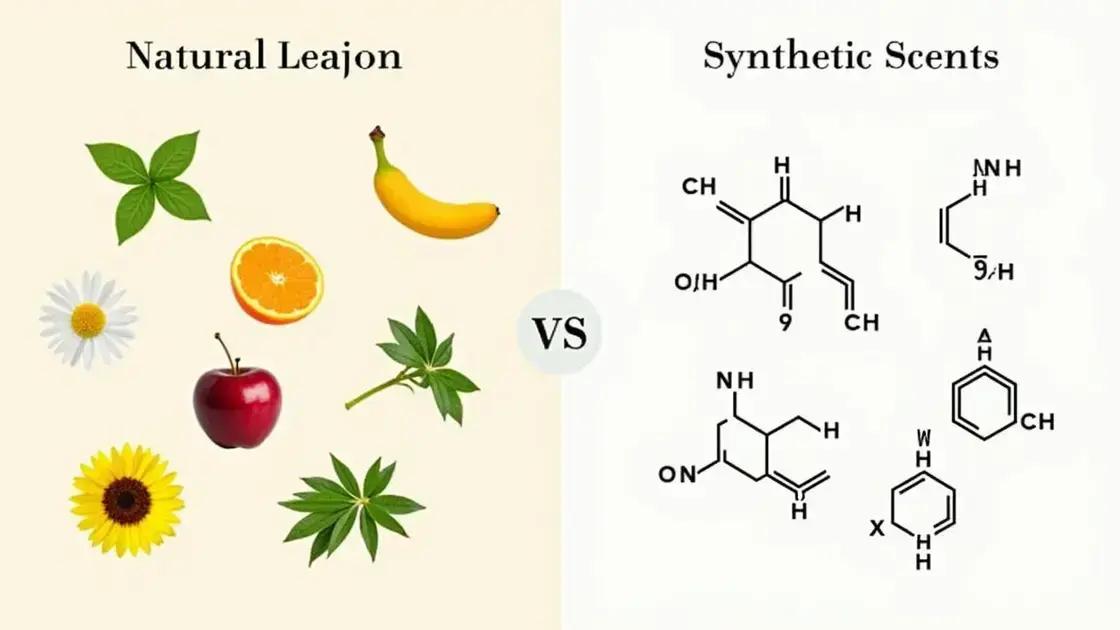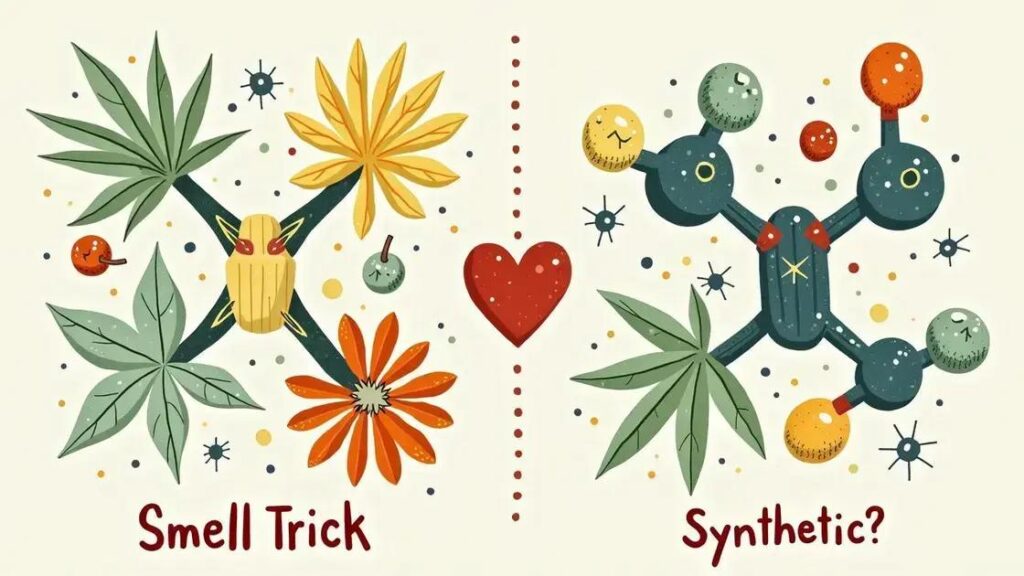The Smell Trick involves how scents can influence our emotions, memories, and behaviors, with natural and synthetic scents both playing significant roles. Scents can evoke feelings, enhance experiences, and impact decision-making in settings like retail and home environments.
The question of whether the Smell Trick is natural or synthetic fascinates many. This intriguing phenomenon plays with our senses, offering a unique twist on how we perceive odors. In this article, we’ll delve into what the Smell Trick is, explore the differences between natural and synthetic scents, and discuss how this impacts our perception. By understanding the nature of the Smell Trick, we can better appreciate its implications in our everyday lives.
What is the Smell Trick?

The Smell Trick is a fascinating phenomenon related to how humans perceive odors. It often involves manipulating or enhancing certain smells to create specific emotions or memories. This trick can occur naturally or be engineered using artificial scents. Understanding it is key to appreciating how we interact with the world through our sense of smell.
How Does the Smell Trick Work?
The Smell Trick works by using combinations of natural or synthetic substances that evoke particular sensations. Our brains associate certain smells with memories or feelings. For example, the smell of fresh cookies may remind someone of home and comfort. The Smell Trick plays with these associations, heightening our emotional response through scent.
Real-Life Applications
This concept is widely used in various industries, such as marketing and therapy. Retailers often use pleasant scents to attract customers or improve their shopping experience. In contrast, therapists might employ specific fragrances to help clients relax or recall memories during sessions.
Natural vs. Synthetic Smells
Both natural and synthetic smells can create similar effects. Natural scents come from plants, fruits, and essential oils, while synthetic scents are chemically engineered. Understanding the differences helps consumers make informed choices about the products they use.
In conclusion, the Smell Trick reveals how powerful our sense of smell is in shaping experiences, emotions, and memories.
Natural vs. Synthetic: The Differences

Understanding natural and synthetic scents is crucial for grasping the concepts behind the Smell Trick. Both types of scents can elicit strong emotional responses, but their origins and compositions differ significantly.
Natural Scents
Natural scents are derived from plants, flowers, and fruits. They contain a complex mix of molecules that contribute to their unique aromas. For example, essential oils extracted from lavender or citrus offer authentic and rich fragrances. These scents often provide therapeutic benefits and are frequently used in aromatherapy.
Synthetic Scents
Synthetic scents, on the other hand, are created in laboratories. These artificial fragrances mimic natural smells but can also produce entirely new odors that do not exist in nature. They are often more affordable and can be produced in bulk. However, some consumers prefer natural scents due to concerns about chemical safety and environmental impact.
Key Differences
The key differences between natural and synthetic scents include:
- Source: Natural scents come from nature, while synthetic scents are man-made.
- Complexity: Natural scents contain a variety of compounds that may not have been fully replicated in synthetic options.
- Cost: Synthetic scents are generally cheaper to produce, making them widely available in commercial products.
- Benefits: Natural scents are often associated with health benefits, while some synthetic scents may cause allergic reactions in sensitive individuals.
Both types of scents have their own advantages and applications, influencing our experiences and perceptions in unique ways.
Effects of the Smell Trick on Perception

The Smell Trick significantly influences our perception, altering how we experience the world around us. Our sense of smell is closely linked to memory and emotion, and these connections can enhance or change our reactions.
Memory Associations
Smells can trigger vivid memories. For instance, a whiff of freshly baked bread may remind someone of home. This phenomenon occurs because the olfactory system is directly connected to the brain’s emotional and memory centers. Thus, the Smell Trick can evoke feelings of nostalgia or comfort.
Emotional Responses
Certain scents can elicit strong emotional responses. For example, lavender is often associated with relaxation, while citrus scents might energize or uplift our mood. The Smell Trick harnesses these responses to influence how we feel in various situations, such as shopping or during therapy sessions.
Impact on Decision-Making
The Smell Trick can also affect decision-making. Research shows that pleasant scents can enhance a person’s willingness to purchase products. In stores, marketing teams often use specific fragrances to create an inviting atmosphere that encourages customers to spend more time—and money—within the establishment.
Behavioral Changes
Moreover, scents can subtly guide our behavior. For example, the scent of vanilla can create feelings of warmth and safety, while sharper scents like peppermint can foster alertness and focus. Utilizing the Smell Trick strategically can lead to enhanced productivity in workspaces or more enjoyable experiences in social settings.
Studying the effects of the Smell Trick on perception unveils how powerful scents can influence our daily lives and interactions.
Conclusion: Understanding the Smell Trick

Understanding the Smell Trick reveals much about human perception and emotion. This concept shows how scents can influence our memories, feelings, and behaviors in various settings.
The Power of Scent
Scents have the ability to evoke memories and feelings almost instantly. When we recognize a smell, our brain links it with past experiences. This connection makes the Smell Trick a powerful tool for marketers, therapists, and everyday life.
Natural vs. Synthetic
In examining natural and synthetic scents, we see that both can create deep emotional reactions. Natural scents offer authenticity, while synthetic scents provide consistency and affordability. Knowing their differences helps us make informed choices when selecting products.
Effects on Behavior and Decisions
The Smell Trick also affects how we behave and make decisions. We are more likely to purchase products when they are paired with pleasant smells. This insight can be applied in various environments, from retail to personal spaces.
Practical Applications
Everyday applications of the Smell Trick include enhancing home environments, improving workplace productivity, and creating memorable experiences in public places. By choosing scents wisely, we can positively influence our surroundings and the emotions of those around us.
Ultimately, learning about the Smell Trick helps us appreciate the subtle yet profound impacts scents have on our lives.
Understanding the Impact of the Smell Trick
The Smell Trick has deep implications for how we experience the world around us. By recognizing the powerful connection between scent, memory, and emotion, we can better understand our responses in various environments.
The differences between natural and synthetic scents show us that both can evoke strong feelings and reactions. This knowledge allows us to make informed choices about the products we use in our daily lives.
Additionally, knowing how scents influence our behavior and decision-making equips us to create more inviting spaces, be it in retail or at home. Enhancing our environment with pleasant aromas can significantly improve experiences and interactions.
In summary, by harnessing the Smell Trick, we can enrich our lives and the experiences of those around us.
FAQ – Frequently Asked Questions about the Smell Trick
What is the Smell Trick?
The Smell Trick refers to how scents can influence our emotions, memories, and behaviors, often enhancing our experiences.
Are natural scents better than synthetic scents?
It depends on personal preference. Natural scents provide authenticity, while synthetic scents offer consistency and can be more economical.
How do scents affect our emotions?
Scents can trigger strong emotional responses and memories, often linked to past experiences, which can enhance moods and feelings.
Can the Smell Trick be used in marketing?
Yes, marketers often use pleasant scents in retail environments to attract customers and encourage them to spend more time and money.
What are some practical applications of the Smell Trick?
The Smell Trick can be applied in homes, workplaces, and public spaces to enhance comfort, productivity, and overall experiences.
How can I choose the right scent for my environment?
Consider the mood you want to create; for relaxation, choose calming scents like lavender, while citrus scents can energize a space.













